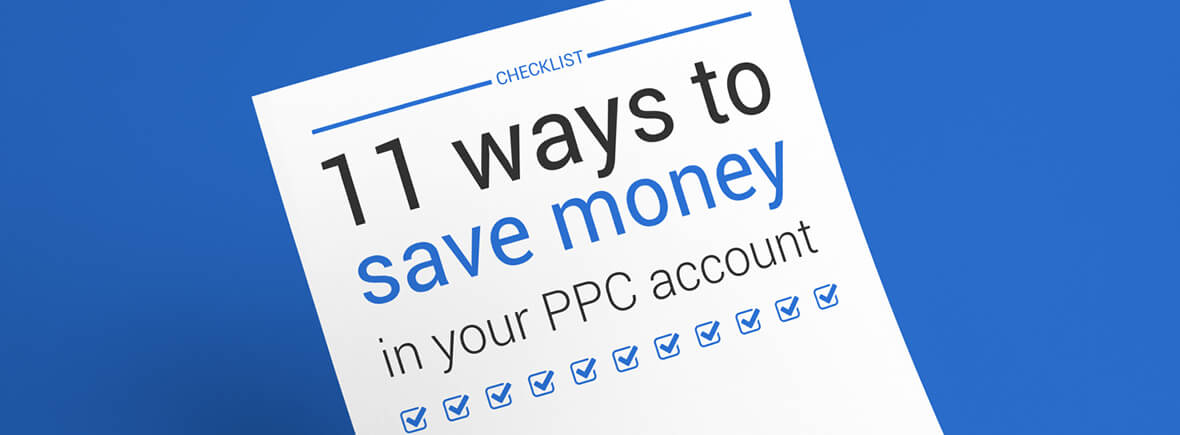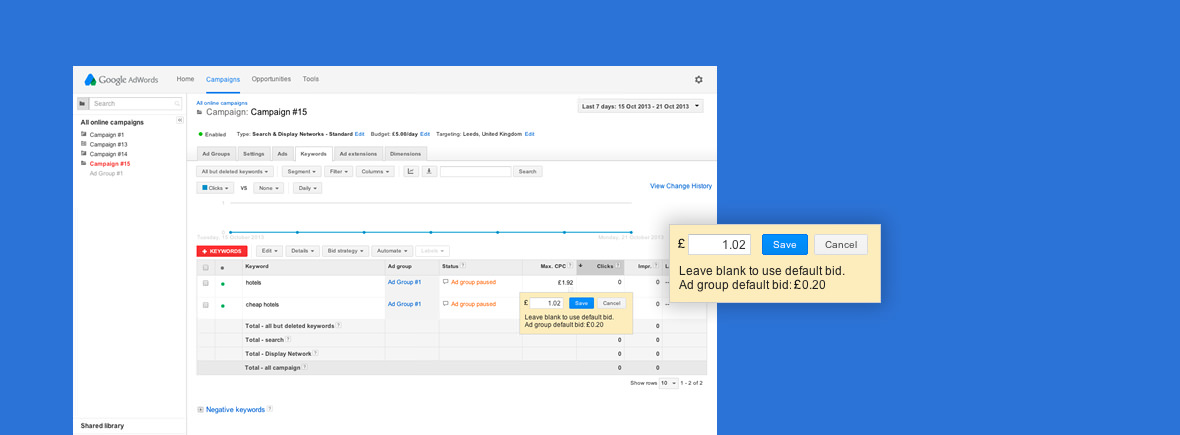
There are many strategies out there which proclaim to offer the best practices when managing your Google AdWords account.
One of our favourite things about the paid search and AdWords communities online is that new tips, tricks and strategies are continuously being uncovered and shared amongst fellow PPC enthusiasts looking to get more value from the accounts and campaigns they manage! The adoption of many of these techniques often comes down to personal preference, however there are several techniques which consistently appear in online guides.
Here are our top 11 PPC management tasks that you should be adopting to ensure effective campaign management of your paid search account(s).
This list includes tasks for daily management, weekly management as well as one off tasks.
Adjust Keyword Bids (Recommended Frequency: Daily Management)
It is important to assess your keyword performance as part of your daily AdWords management/strategy. You need to regularly adjust to bids to ensure that they are not overspending unnecessarily or underperforming.
The amount of competition for keyword bids is constantly changing; if you become complacent with your bids, then you can easily see your ads knocked out of top positions. Failure to remain responsive, where daily keyword bid adjustments are concerned, will mean you lose out on potential favourable interactions.

Add Negative Keywords (Recommended Frequency: Daily Management)
Negative keyword lists involve adding keywords to a suppression list to stop irrelevant search queries (containing your negatives) from triggering your ads. There are many reasons one might utilise negative keyword lists, however the main reason is to stop your ad showing for irrelevant or inappropriate search queries.
Generic negative keyword lists can be found online and these are worth researching and including before you set your campaign live. PPC professionals have spent many years building up lists of phrases which simply don’t convert, and this knowledge is freely available to anyone willing to look for it! You may also want to add competitors that you wish not to show for before you launch the campaign.
Once your campaign is set live, it is an effective strategy to regularly sift through your search query reports daily to find search terms that are triggering your ads, but are irrelevant to your business, products, or services. These phrases can then be added to your negative keyword list(s).
Negative keyword lists are essential to an efficient paid search campaign. They can be added at ad-group, campaign, or account level.
Pause Poorly-performing Keywords (Weekly Management)
They may be keywords that on paper are expected to perform well, yet in practice these may well end up underperforming. It is important to identify these terms and pause them, unless you can fix them.
There is little to no point in showing for keywords with high associated costs, that are producing little or no interactions/conversions.
Add Long-Tail Keywords (Weekly Management)
Long-tail specific search queries may not have the same high search volumes as the broader, more generic terms. However, they are worth bidding for as they will have less competition and therefore a lower CPC.
Another benefit to targeting long-tail search terms, is that it will allow your ad to be triggered for search terms highly relevant to your product/service. This will target users further down the customer purchasing journey. Targeting users with more intent in their search queries is far more likely to result conversions.
You can find long-tail keywords by using keyword research tools such as Google’s free keyword planner. You can also add in search queries found in your search query report as exact match keywords as you may not already be targeting long tail phrases which triggered your ad through broad or phrase match targeting.
Review Keyword Match Types (Weekly Management)
Broad match keywords will indeed show for all search terms related to your business, however they may also show for many irrelevant search terms which can result in a very costly AdWords campaign!
The use of more restrictive match types such as modified broad, phrase and exact is suggested for running an effective and efficient campaign.
Your impression volume will decrease, when using these more restrictive terms. But your ads will be more relevant for the users they trigger for. Resulting in lower CPA, higher interactions, and high quality scores.
Declare A/B Test Winners (Monthly Management)
Split testing is an important PPC practice for account optimisation. However, split tests are often left to run for far too long, giving the losing ad/landing page far too much screen time.
Regular reviews of your split tests, will allow you to decide with sufficient data, which ads need removing. Allowing you to give increased visibility to winners.
Break Out New Ad Groups (Monthly Management)
As you add more keywords to your existing ad groups, your topic will become increasingly varied. This means that you will have to either start using generic ads, or group out the keywords to create more specific and granular ad groups.
As a rule, if you find yourself with around 20-30 keywords in an ad group, then you might want to start looking on how you can separate these out. This will allow you to create highly-customised ad copy for each. Where ad copy is more relevant to the keywords triggering the ad, you will obtain better quality scores, higher CTRs and ultimately drive more efficient performance.
Review Device/Location/Time of Day Performance (Monthly Management)
There are many AdWords settings available that allow you to manage when your ads show. These include device, location, and time of day. These should be set reviewed times in relation to data seen within AdWords and Google Analytics.
Revise Landing Pages (Monthly Management)
One of the reasons your campaign might be showing low conversion rates could be down to the landing page, rather than anything within AdWords. It is important to regularly review landing pages to ensure that they are highly relevant to the keyword and that the user experience is optimal.
If users can’t find what they are looking for easily, then they won’t convert and the chances are they’ll move onto a competitor and you’ve lost the opportunity.
You can test user experience by following the conversion path from your landing page to the conversion destination. If you have any issues or see areas for improvement then these are definitely worth noting down and sharing with the team responsible for maintaining the website.
Create a Branded Campaign (One-time Setup)
The use of a branded campaign(s) can be an extremely effective AdWords strategy, especially if the business you are marketing is long standing and highly recognised within their industry.
Branded campaigns are usually the best converting campaigns within accounts. As competition is low, and associated traffic is highly-qualified as the customers already know and recognise your brand.
Be sure to include a brand campaign to reap the rewards of these lower cost, high converting keywords.
Run a Remarketing Lists for Search Ads (RLSA) Campaign
RLSA enables campaigns to be created with ads that will only be triggered if a user is on your remarketing list and searching with keywords you are bidding on. As these users are highly qualified, the campaigns often generate higher click-through rates and conversion rates, leading to better Quality Scores and low CPAs.
If you are struggling with your AdWords or paid search accounts, Ascensor are Google AdWords certified. Our friendly, expert and transparent paid search team are more than willing to help improve the efficiency of your AdWords campaigns.
Contact Ascensor today for a free AdWords campaign review!